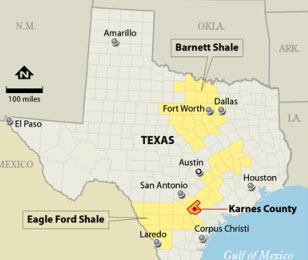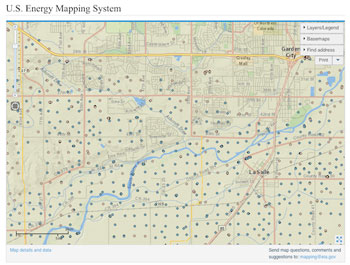Besides referendums on GMO labeling, there are important fracking bans on the ballot in Texas, Ohio and California in November that could have far-reaching effects if they pass.
In blood red state Texas, Denton will have a tough time in its bid to control fracking. It sits in the center of Barnett Shale, one of the two huge shale zones in Texas, and there are 270 active wells within city limits.
"The city and state have repeatedly failed us. My family is breathing horrible fumes, we can’t enjoy our property and we’re trapped because no one else wants to live here. To protect our homes and our health, we’ve got no choice but to ban fracking," says a homeowner. "We are out of options – the city is allowing fracking to happen right in our backyards."
As usual, industry money far outstrips that of citizens, about $250,000 to $50,000. Denton’s representative at the state level says he’ll introduce a bill that prevent local governments from banning fracking.

In California, voters will decide on fracking bans in three counties: San Benito (where Pinnacles National Park is), Mendocino and Santa Barbara – the largest by far with 400,000 residents. The city of Los Angeles and Santa Cruz county have already banned fracking.
Oil companies are spending about $2 million to defeat the ban in San Benito County and $5 million in Santa Barbara County, reports San Jose Mercury News.
In Athens, Ohio, Issue 7 would ban fracking and fracking-related activities within city limits by establishing a community bill of rights "elevating the rights and governance of the people of Athens over those privileges bestowed on certain extraction corporations."
In Colorado, Longmont restricted – but didn’t ban – fracking in the 2012 election and they’ve been fighting to uphold the ordinance ever since.
After two years of litigation, Colorado’s Oil and Gas Conservation Commission and Colorado Oil and Gas Association dropped the lawsuit to invalidate the ban. It was dropped in exchange for keeping fracking referendums off this year’s ballot and for the Governor creating a state-wide commission.
Here are the ballot measures across the US on minimum wage, GMOs, fracking, reproductive rights, and marijuana:
Ever since Longmont, Boulder, Lafayette and Fort Collins passed fracking referendums, there’s been a fight between local and state control of the issue. Colorado law says the state trumps local governments on decisions related to oil and gas operations, but with 52,000 active wells, 74,000 abandoned wells, just 13 inspectors and 500 spills a year, it’s gotten way out of hand.
There are plans for 3000 more wells each year and many are now near suburban neighborhoods and rivers. There are daily spills, contaminating soil and water, and air pollution has become a major problem in an area previously known for some of the cleanest air in the US.
Wells in Greeley, Colorado!:

The Colorado Oil and Gas Association, however, is charging ahead with lawsuits against Fort Collins and Lafayette, and a judge recently overturned Fort Collins’ moratorium.
The industry successfully prevented Loveland’s referendum from passing.
Longmont’s ordinance is typical – it bans oil and gas drilling in residential areas and requires setbacks from homes, schools, hospitals, waterways and parks. Emergency responders must be informed of hazardous chemicals being transported through the city and local wildlife experts must be consulted before any operations begin.
"In the absence of adequate state rules governing oil and gas development, local governments must be able to step in to protect public health and the environment," says Catherine Collentine for Sierra Club.
Referendums dropped from this year’s ballot: one would amend the state constitution with an environmental bill of rights that give local governments precedence when their laws conflict with the state; the other would require 2,000-foot setbacks from homes, schools and hospitals. Two industry sponsored referendums were also dropped as part of the deal, which would have denied tax revenues from oil and gas if towns limit or ban fracking.
Governor Hickenlooper created the Oil and Gas Task Force, charged with recommending state drilling regulations. Although not one person out of the 19 selected is from communities that passed fracking referendums, there’s a representative from the most fracking-intense county (Weld), along with environmentalists and various industry and state representatives.
Many people are furious about the deal, saying Democrats caved to the oil industry in fear of losing this election. The anti-fracking referendums have huge grassroots support with close to 300,000 signatures. But industry would have poured in some $50 million to prevent them from passing, boosting Republican candidates.
If the commission can’t agree on recommendations or the state legislature doesn’t pass anything, activists plan to return with referendums in 2016, when many more people with anti-fracking sentiments will be voting.
